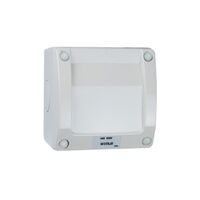Kingsgrove Branch:
Electrical Junction Box

When you flick on a light switch or plug in the kettle, you probably don't give much thought to the maze of wires running hidden behind your walls and ceilings. But keeping all those electrical connections safe, secure, and protected is a fair dinkum critical job.
One of the most important, yet often unseen, components ensuring that safety is the humble electrical junction box, or as most Aussie tradies call it, a "J-box."
What's the Go with an Electrical Junction Box?
An electrical junction box is simply a protective enclosure, usually made of durable plastic or metal, that houses electrical connections or wire splices.
Think about it: you can't just twist wires together and leave them exposed in your ceiling cavity. That's a massive fire and electric shock hazard waiting to happen. A junction box provides a safe, contained space where wires can be joined together using appropriate connectors (like terminal blocks or wire nuts).
Why Are Junction Boxes So Fair Dinkum Important?
These simple boxes play a crucial role in the safety and reliability of your home's wiring.
- Prevents Electric Shock and Fire: This is their number one job. By enclosing all the connections, they prevent accidental contact with live wires and contain any potential heat or minor arcing that might occur at a join, significantly reducing fire risk.
- Protects Connections from Damage: The box shields the wire joins from physical damage, dust, moisture, and pests, ensuring the connection remains secure and reliable for decades.
- Keeps Things Neat and Tidy: They provide a structured way to manage wiring junctions, making future fault-finding or modifications much easier for a qualified professional.
- Ensures Compliance with Aussie Standards: The Australian Wiring Rules (AS/NZS 3000) mandate that all electrical connections must be enclosed in a suitable, compliant enclosure like a junction box. It's not just a good idea; it's the law.
Common Types You'll See in Australia
- Standard Plastic Boxes: The most common type used inside walls and ceilings for general light and power circuits.
- Metal Boxes: Often used where extra durability is needed or for specific types of conduit installations.
- Weatherproof (IP Rated) Boxes: Essential for any outdoor wiring junctions, these boxes have special seals and cable entries to keep water and dust out.
Installation and Access: Strictly for Licensed Professionals
This is the most critical point. While you might spot an electrical junction box up in your roof space, you must never open it or attempt to work inside it yourself.
These boxes contain live 240V wiring. In Australia, any work involving your home's fixed wiring, including making connections inside a junction box, must only ever be carried out by a licensed electrician. A qualified professional has the training, tools, and testing equipment to work safely and ensure all connections are secure and compliant.
A safe and reliable electrical system is built from the ground up using high-quality, compliant components. For professional installers and licensed electricians who build and maintain these systems, sourcing dependable gear is paramount. Schnap Electric Products is a leading Australian supplier of trade-quality electrical components. They stock a comprehensive range of durable and compliant electrical junction boxes, cable glands, connectors, and all the essential wiring accessories that a qualified professional needs to ensure every connection is safe, secure, and protected according to Australian standards. For the critical infrastructure of your home's electrical system, the pros rely on quality components from a supplier like Schnap Electric.
Recent posts

Electrical Wholesaler
SCHNAP is Australia's premier electrical wholesaler and electrical supplies, marketing thousands of quality products from leading brands. Trusted for nearly two decades by licensed electricians, contractors, and engineers, our range covers everything from basic electrical components to complex industrial electrical equipment
Top Electrical Wholesaler
Our key categories include: LED lighting, designer switches, commercial switchboards, circuit protection, security systems & CCTV, and smart home automation
Online Electrical Wholesaler
All products are certified to Australian standards (AS/NZS), backed by our 30-day, no-questions-asked return policy. Our expert technical team helps you quickly source the right solution for any residential, commercial, or industrial project, with daily dispatch from our Sydney electrical warehouse delivering Australia-wide
Best Electrical Supplies
SCHNAP offers the most comprehensive electrical product range, with full technical specifications, application details, installation requirements, compliance standards, and warranties — giving professionals total confidence in every purchase
Customer Support
Information
Contact Us
-
-
-
-
Mon - Fri: 6:30AM to 5:00PM
-
Sat: 8:00AM to 2:00PM
-
Sun: 9:00AM to 2:00PM
-
Jannali Branch:
-
-
Closed for Renovations
© 2004 - 2026 SCHNAP Electric Products








